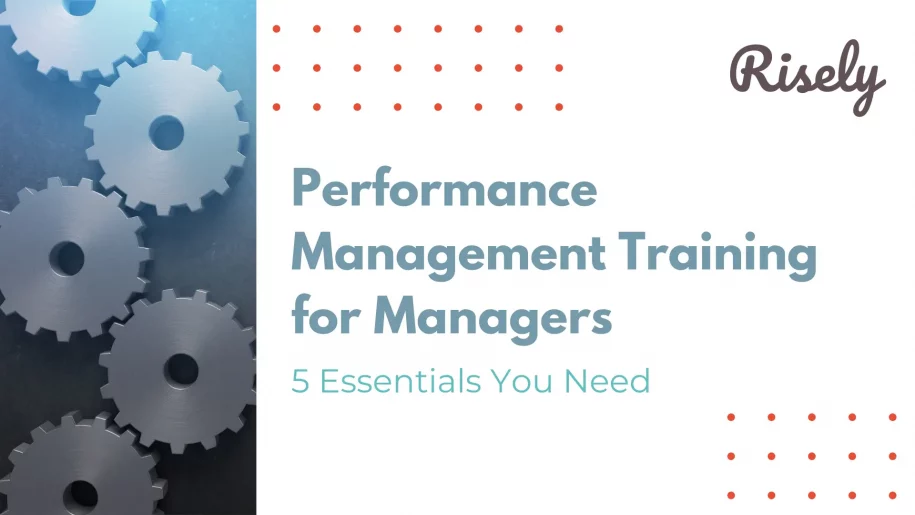Performance Management Training for Managers: 5 Essentials You Need
As a manager, you have a lot on your plate. From overseeing projects to managing teams, your responsibilities are numerous. One of the most crucial roles of a manager is ensuring that your team is performing at its best. This is where performance management training comes into play. In this blog, we will delve into the importance of performance management training for managers and how it can benefit both your team and business. We will also explore the impact of performance management training on business results and discuss critical skills you can build through such activity. Finally, we’ll provide tips for choosing the right program and delivering practical performance management training sessions to help you start your journey toward becoming an exceptional manager.The Importance of Performance Management Training for Managers
Enhancing workforce performance is crucial; effective performance management strategies can help achieve this. Performance management training plays a vital role in improving employee productivity and engagement. By implementing performance management best practices, organizations can develop a high-performance culture. It is essential to align individual goals with organizational objectives to drive business results. Performance improvement plans can also be implemented to address any performance pain points.What is Performance Management Training?
Gain a comprehensive understanding of performance management concepts and techniques, including effective goal-setting and performance expectations. Explore the role of feedback and coaching in performance management, and learn about various performance appraisal methods and tools. Develop valuable skills in conducting performance discussions and providing constructive feedback to employees. Participating in performance management training can enhance your knowledge and abilities in this crucial aspect of human resources. Take advantage of this opportunity to learn how to drive high performance and create a culture of continuous improvement. Additionally, gain insights into additional information that can further support your performance management efforts.Key Benefits of Performance Management Training
Performance management training is needed to help organizations improve the performance and productivity of their employees. It gives employees the necessary skills and knowledge to set goals, measure progress, provide feedback, and improve. By implementing effective performance management practices, organizations can better align individual and team goals with overall business objectives, identify areas for improvement, recognize and reward high performers, and address performance issues promptly. Performance management training also helps to create a culture of continuous learning and development, where employees are empowered to take ownership of their performance and growth. Performance management training is essential for organizations to optimize their human resources and drive success.The Impact of Performance Management Training on Business Results
Effective performance management training has a significant impact on business results. By aligning individual performance with business goals, organizations can drive success. This training also maximizes the potential of top talent, allowing them to contribute at their highest level. With access to performance data, managers can make informed decisions and allocate resources effectively. Furthermore, performance management training enhances employee accountability and ownership of results. By fostering a culture of continuous improvement and innovation, organizations with an employee-centric approach can achieve long-term success. The impact of performance management training on business results cannot be overstated.Identifying Areas for Performance Management Training Intervention
Analyzing key performance indicators (KPIs) and assessing employee performance trends is essential to identify areas for performance management training and intervention. This helps pinpoint specific needs, such as skill gaps and development opportunities for individuals and teams. Organizations can determine training priorities and allocate resources by utilizing performance data. Targeted training programs can then be implemented to address performance challenges and fill the gaps. These interventions contribute to enhancing overall team performance and fostering a high-performance culture. Some key focus areas for performance management training can be:- Emotional Intelligence: Developing emotional intelligence can help managers navigate sensitive performance discussions and build stronger relationships with team members.
- Crisis Management: Training can prepare managers to handle performance crises or challenging situations, such as addressing serious misconduct or ethical violations.
- Talent Development: Training can cover talent development strategies, including identifying high-potential employees, providing growth opportunities, and succession planning and talent management.
- Performance Feedback and Coaching: Training can help managers provide regular, specific, and actionable feedback to help employees improve their performance. It also teaches coaching techniques to support skill development and growth.
- Performance Appraisals: Managers can be trained to conduct fair and objective performance appraisals or reviews, ensuring they are consistent and focused on performance improvement.
Improving Employee Performance through Performance Management Training
A crucial aspect of performance management training is empowering managers with tools and techniques to enhance individual and team performance. Organizations can foster an environment of continuous improvement by equipping managers with the skills to provide effective feedback and coaching. Additionally, developing goal-setting capabilities and creating performance development plans enables managers to guide employees toward success. Moreover, recognizing and rewarding high-performing employees cultivates a performance-driven culture that values growth and learning. Organizations can optimize their human resources through performance management training and drive high performance.Other Interesting Reads
Building Key Skills through Performance Management Training
Enhancing communication and interpersonal skills is crucial for effective performance management. Developing the ability to give and receive feedback facilitates performance improvement. Improving goal-setting and performance-monitoring capabilities helps track progress and identify areas for growth. Strengthening conflict resolution and problem-solving skills allows for constructively addressing performance issues. Performance management training fosters leadership and managerial competencies, empowering managers to drive employee performance. These essential skills, when honed through performance management training, contribute to creating high-performing teams and fostering a positive work culture:- Goal-setting: Managers can learn how to set clear, measurable, and achievable goals for their team members, aligning individual objectives with organizational goals.
- Feedback and coaching: Managers can remember how to provide constructive feedback and guidance to their team members, helping them improve their performance and develop their skills.
- Performance evaluation: Managers can learn how to assess and evaluate the performance of their team members objectively, using data-driven metrics and performance reviews.
- Communication: Managers can enhance their communication skills, learning how to effectively convey expectations, give feedback, and address performance issues with clarity and empathy.
- Conflict resolution: Managers can develop skills in resolving conflicts and managing difficult conversations within the team, fostering a positive work environment.
- Motivation and engagement: Managers can learn strategies for motivating and engaging their team members, promoting ownership, commitment, and job satisfaction.
What Qualities to Look for in Performance Management Training?
When choosing performance management training, consider programs that align with your organization’s needs and goals. Look for trainers with expertise and experience in the field, and ensure the training covers essential topics. Additionally, seek recommendations from other organizations that have undergone similar training.Choosing the Right Performance Management Training Program
Choosing the right form of training is essential to ensuring effective performance management. A few key metrics to choose from in performance management metrics include:- Adaptability: The performance management training should be able to provide solutions to your challenges instead of generic information sharing. The solutions will remain ineffective if they cannot adapt to your needs. Hence, adaptability that helps make interventions suitable to particular cases is essential.
- Proof of work: A generally good rule is to go for performance management training to provide evidence of results. Look for platforms that experts back and provide certifications for your achievements through assessments and evaluation of skills.
- Continuous Support: You must seek performance management training methods to provide ongoing support. It can take various forms, such as regular check-ins with the guide or constant chat support. This feature is crucial as it helps clarify doubts and concerns in real time and also allows you to learn beyond the scope of the syllabus set by the trainer.
What Are the Different Types of Performance Management Training Available?
Performance management training comes in many forms. A few common types are listed below to help you choose the best one for yourself:- Workshops and Seminars: Workshops and seminars headed by industry experts are among the most conventional forms of training. Yet, there are a few issues because they do not resolve doubts specific to your problems. While the quality of content shared is excellent, the time and costs required can often be restraints.
- Coaches and Mentors: Another way is to team up with someone with greater experience than you and can offer real insights to help beat similar challenges. The challenge lies in finding someone who can understand your challenges, share wisdom and experiences openly, and guide others! While the number of conditions makes it seem like an uphill task, a good mentor can bring significant changes.
- Self-Guided Methods: The internet is full of resources to take your learning journey in your hands. YouTube videos, podcasts, and books can be a great resource once you figure out the right ones to be trusted and applied.
- Tech-enhanced Coaching: With the advent of technology, no industry is left behind, including solutions for enhancing leadership and management capabilities. Solutions like the AI-based leadership development platform Risely are bringing novelty to the industry by mixing the best of all – ensuring expertise, consistency, and smooth user experiences that result in team success.
Tips for Effective Performance Management Training Delivery
Creating a supportive and inclusive learning environment for participants is essential to ensure adequate performance management training delivery. Engagement can be heightened by incorporating interactive activities and case studies, making the training more impactful. Providing opportunities for practice and application of learned skills allows participants to develop their abilities further. Additionally, offering ongoing support and resources ensures that the learning is sustained beyond the training program. It is important to evaluate the effectiveness of the training through participant feedback and performance outcomes. These tips will contribute to a successful performance management training experience.Conclusion
In conclusion, performance management training for managers is crucial for the success of any organization. It equips managers with the necessary skills and knowledge to effectively manage and improve employee performance. By understanding performance management principles and implementing them in the workplace, managers can create a positive and productive work environment. It not only benefits the employees but also has a direct impact on business results.Get started on a journey of growth (for free!)
Take your first set of leadership skill assessments for free now to kickstart learning and professional growth.
Other Related Blogs
How to build and retain high performing employees? | Laletha Nithiyanandan
How to build and retain high performing employees? | Laletha Nithiyanandan Are you really an HR if you have not spent hours chasing the ideal high performing employees for your…
How Can You Build A High Performing Culture? 7 Hacks
How Can You Build A High Performing Culture? 7 Hacks We have all heard of dream teams and tried to build them with varying levels of success and failure. Among…
10 Effective Manager Performance Goals to Drive Team Success
10 Effective Manager Performance Goals to Drive Team Success You’re sitting across from a manager in a performance review meeting. They seem unsure, disconnected from the company’s vision, and oblivious…
How to Build a High-Performing Team?
How to Build a High-Performing Team? Creating a high-performing team is a goal that every organization aspires to achieve. A high-performing team achieves superior results and can quickly adapt to…


